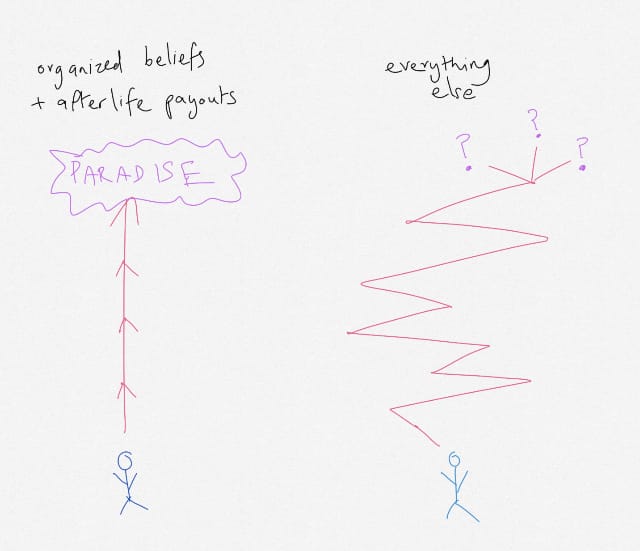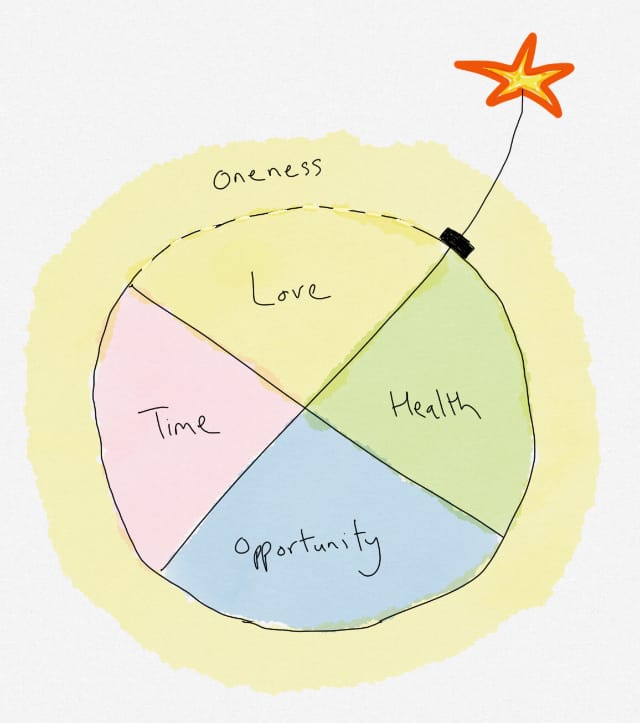Meaning and fulfilment
2024-08-01
How does one live a fulfilling life?
It's a question that any thinking or introspective human being asks at some point in their lives. It's also a question that gains prominence as we age because we come to see ever more clearly that life has a certain repetition to it. We become aware of these life "patterns", both in our own existence and in the wider society and world. Since the human mind is a fantastic pattern processing system it adapts to patterns quickly and thus needs new stimulation to feel "fresh". But everything fresh eventually becomes old, and the mind is left wanting.
And hence the question arises.
An easy way to answer this question is to buy into an organized belief system which posits to know the true nature of reality and is thus able to promise you an ideal outcome if you play your cards right. For example, organized religions promise you a great afterlife if you live piously. What makes it easy to go along with these belief systems is the knowledge that there are millions of other people doing the same thing as you. This gives you two reassurances: a) that you're not doing this alone, and b) that the ideas you're following have been socially validated for a long time.
The benefit of these belief systems is that it does away with cognitive load and keeps things simple. Life gains certainty. The trade-off is that you don't really get to explore all the weird and wonderful ideas you could have about life.

(Image credit: me, CC BY-SA 4.0)
It should be noted that there are numerous belief systems which encourage you to ask questions and find answers for yourself and not blindly believe what you're told. Classical Buddhism is an example of this. I think of these belief systems as saying "Here is how the world works, but you don't have to take our word for it. Find out for yourself, and we're fairly certain you'll arrive at the same conclusions.".
This aside, the fundamental truth is that: the meaning of life is ultimately whatever we want it to be.
Having said that, there are patterns to life and human existence. Understanding these patterns and knowing what is always true can guide us towards living more meaningfully without having to buy into beliefs about the afterlife or be able to answer questions about the true nature of reality.
As a general rule of thumb, if multiple humans can - through independent and original thinking over the course of centuries and millennia - arrive at the same belief system, then that system has legs and contains some truth in it.
Logic dictates that any such system would be focused on the core experience of being human as opposed to fanciful ideas of gods, angels and demons since evidence can't be found for these things. The core experience of humanity is comprised of physical reality, biological drivers, thoughts and emotions.
So how do we make a start in figuring this out?
Let's take Abraham Maslow's hierarchy of needs as an example. It attempts to explain what humans need from lives in order to live and grow to their potential, arranged in a hierarchical order. At various times in life different needs are more intensely sought after than others, depending on where a person is in their growth trajectory.
(Image credit: Philipp Guttmann, CC BY-SA 4.0)
This seems logical - physical needs must be met first, followed by emotional needs, followed by intellectual needs and growth opportunities.
My own list of needs looks like this:
- Time
- If you only have 10 seconds to live then the rest of this article doesn't even matter. You need to be alive in order to experience life. Time is a finite resource for everyone. The more of it you can create for yourself, the better.
- To be curious is a natural trait, in both humans and animals. Curiosity requires the free time to be curious.
- Health
- If you're ill (physically or mentally) you can't enjoy life as much, no matter how much time you have. Looking after one's health is essential.
- Your environment must also be healthy. Greenery. Good air, food and water. Safe physical spaces. No predators. Friendly people.
- Love
- Knowing that you're wanted, loved and valued is important. Friendship matters. Family matters. Community matters. The tribe matters.
- Giving love is important. Giving love makes it easier for us to receive it without guilt or hesitation.
- Knowing who you can trust (a form of love) is important. This adds to your sense of safety as well as community.
- Opportunity
- Humans are naturally inclined to create, explore, accomplish, and grow.
- The mind adapts to every new level of experience. To experience the same high again a human must aim for something new. This requires the opportunity for something new.
Money isn't mentioned here because it's just a tool to acquire the wealth we actually need, whether that be time, things, services, etc. It's possible to acquire or receive wealth without needing money. Also, even if you don't have money, if you have lots of people who love you then you're probably going to be ok. Also note that the needs feed into each other. For instance, you need time and health to create opportunity. The growth we get from opportunity helps us be better with ensuring our health and love needs are being met.
My list is roughly in line with Maslow's hierarchy except that I'd put self-actualization as being achieved by maximizing all of the four needs. Personal achievements and intellectual pursuits are very fulfilling, but focusing on those at the expense of love and community won't get you there.
Towards his later years Maslow was also deeply influenced by the Buddhist "Bodhisatva path". He ended up amending his model to add "self-transcendence" as a state that comes after self-actualization. To transcend the self was to be liberated from one's own ego and to live to help the world and others. He saw this as a peak experience of being human.
I would place self-transcendence - oneness with the world - under Love but as the highest expression of love to aim for. Being at one with people and the world means being at peace in one's mind and having no need to compete with others or fear them. It's very important to note, however, that there is a difference between the idea of oneness and the experience of oneness. The former is just an intellectual viewpoint that can be arrived at through reason, whereas the latter is a feeling which naturally gives rise to the associated intellectual viewpoint.

(Image credit: me, CC BY-SA 4.0)
The backdrop to all of these needs is the uncertainty of life itself. We don't really know when we are going to die.
Death is hastened through danger and delayed through safety. If I lock myself into a safe space or routine and never venture beyond those boundaries I should be able to avoid a number of potential disasters. But I still can't guarantee how long I'll be alive for, never mind the fact I will miss out on much exploration and growth.
Thus it's essential to find meaning and fulfilment in what was and what is, rather than what will be. Being thankful for the experiences you have had, and finding depth and meaning in the experiences you are currently having. Of course, this is easier said than done. We're not always experiencing something enjoyable. Moreover, there are potentially painful memories, fears about the future, and unfulfilled desires gnawing at us at all times, taking us away from the moment.
It's good to return to the core truths. Life is temporary. Every frustration, sadness, failure, success, happiness, etc is a part of this temporary experience. Every day is a gift, because you don't know when you'll die. This means that growing old is actually a privilege, because it means you get to experience life for longer.
Whatever you experienced before and whatever you're experiencing now are what actually make up your life, not whatever you wish existed in your life. This is a sobering thought that brings us back to reality. You can dream. And you should dream big. And chase those big dreams. Just remember:
The actual story of your life is what you actually end up experiencing, whether that be what was in your dreams or not.
